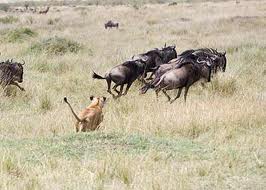Everyone has biases or judgments that support a belief that separating out the best from the rest is important and right. Biases make us feel smart or right through insidious means, dividing our connections with humanity towards a feed. Separation calls the feeder.
We see this in nature. Lions and other predators seeking a feed will focus on the one prey animal that shows signs of or is separate from their group.
When biases come up in our daily life, they lead to a need to find supportive evidence. What follows the list of supportive evidence is defensiveness. Every judgment requires defense. Defense brings on separation, which brings on the feeders and feeders bring on more need to defend – a self-serving loop. Like using drugs, the dealer gets money and the user loses their self worth and feels they need more drugs to get back to “normal.” It’s a circular system that is fed one way and depleted the other (parasitic).
The feed on the frustration of separation can become addictive.Taking away the feed might be just as difficult for the feeder as it would be for the fed upon.
If we want to help ourselves and others, our intent is a place to start. Intent opens the windows of awareness. Biases by nature are hidden – becoming aware of our biases, usually when pointed out by others, opens up the feeding gates or releases our bias and sense of separation, lessening the feed – it’s our choice.
When we become aware of the hidden virus in bias within our “I know what is real” programming, we can do something about them to help us get back on track.


I like your progression from bias through supportive evidence and defense to separation. I always feel separate and often alone when I feel defensive – as when I feel offended, for example. My feelings of frustration about go through the roof at those times. I’d never really associated my biases in that manner, though – and I think you’re on to something there, for sure.
Biases are definitely insidious and difficult to detect on our own. I can’t recall ever discovering one on my own – awareness of my biases has always come from someone pointing them out to me. And when one is pointed out, I very often get defensive – a knee-jerk reaction that protects the bias, I’m sure. Very insidious.
And then, of course, there may be positive biases – those that actually assist us or help us survive (for example, I have a bias against cigarettes).
Awareness, I believe, is most of the way toward cure/solution. Appropriate action is the rest (and definitely easier than awareness).